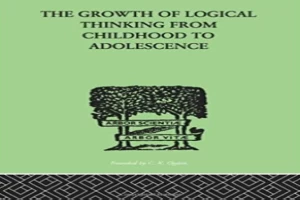Newly released
This book is new and will be uploaded as soon as it becomes available to us and if we secure the necessary publishing rights.

The Growth of Logical Thinking From Childhood to Adolescence Book PDF
(0)
Author:
Jean PiagetNumber Of Reads:
91
Language:
English
Category:
Social sciencesSection:
Pages:
393
Quality:
good
Views:
1573
Quate
Review
Save
Share
New
Book Description
SOME of those who are drawn by the psychological title to choose
this book from the display shelf may be tempted to put it down
when they discover how many pages are filled with v's and D 's or
p's and q's. But their interest is not misplaced, for this is not a work
on logic. It is a book which should be relevant both to the experi-
mental psychologist interested in cognition and to the clinical
psychologist or psychiatrist who deals with children or adoles-
cents and who would like to know more about ego development.
Logic does appear, both in that it is the more strictly logical
aspects of the child's and the adolescent's thinking which make
up the subject matter of the book and in that logical notation is
used to provide a structural model of their thought processes. But
this, we think, is not sufficient reason for putting it down, even
for the person whose traumatic experiences with high-school
mathematics have erected barriers around that part of the cogni-
tive field labeled "abstract symbolism."
Jean Piaget
Jean Piaget was a Swiss psychologist, born on August 9, 1896, in Neuchâtel, Switzerland. His first interest in zoology, when he was a young man and published an article in which he talks about his observations on the albino, has written many publications regarding mollusks and won the admiration of many, and by 15 years she had gained fame among European zoologists, as he studied zoology and philosophy and obtained He received his Ph.D. from the University of Neuchâtel in 1918. The psychologist and geneticist is best known for his theory of cognitive development, which looked at how children develop intellectually. Before his theory, children were seen as small adults, but Piaget proposed the idea that children think very differently. About the way adults think, and this theory has influenced developmental psychology and became a branch of it, and contributed greatly to the field of education, and was known as a pioneer in the constructivist theory, which indicates that people build their knowledge Actively drawing on their ideas and experiences, he began to show an interest in the natural sciences at an early age, at the age of eleven, beginning his work as a researcher when he wrote about the albino.
Read More
Book Currently Unavailable
This book is currently unavailable for publication. We obtained it under a Creative Commons license, but the author or publisher has not granted permission to publish it.
Rate Now
5 Stars
4 Stars
3 Stars
2 Stars
1 Stars
The Growth of Logical Thinking From Childhood to Adolescence Quotes
Top Rated
Latest
Quate
Be the first to leave a quote and earn 10 points
instead of 3
Comments
Be the first to leave a comment and earn 5 points
instead of 3